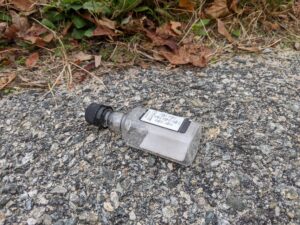New England Aquarium is celebrating the hatching of their 100th epaulette shark, the latest juvenile in a long-running rearing program by the institute. Scientists with the program say it’s an integral tool in better understanding the local marine ecosystem.
The following is the full statement from the New England Aquarium.
The shark, a male, hatched on January 10. He will remain behind the scenes in the Aquarium’s shark and ray rearing system in Boston for five to six months until growing large enough to join other juveniles in the Science of Sharks exhibit. His father has lived at the Aquarium since 2008 and, at 22 years old, is the oldest epaulette shark on record in the Association of Zoos and Aquariums (AZA) studbook program, which documents the pedigree and entire demographic history of animals in the care of AZA-affiliated institutions. “This is a really exciting milestone and shows the experience and success we’ve gained with this species.
Caring for animals throughout their entire lifespan allows us to learn more about their development, characteristics, and longevity, which ultimately allows us to provide them the ability to experience excellent welfare,” said Sarah Tempesta, manager of Interactive Exhibits at the Aquarium. The Aquarium began breeding epaulette sharks in 2009 and reached consistent success in 2012, when it started keeping more detailed records of hatchlings. It takes five months for the shark eggs to hatch after being deposited by the female, and about seven years for them to become full grown—about 3 feet long. An average of four shark pups hatch each year at the Aquarium, and the majority of the sharks that have been reared at the Aquarium have the same father.
Rearing sharks in-house helps the Aquarium fulfill its sustainability goals, providing animals to be on exhibit rather than collecting them from the wild. Most of the Aquarium’s epaulette sharks are females, which helps maintain a healthy genetic population. The Aquarium sends some of its shark offspring to other zoos and aquariums around the country. “The New England Aquarium’s rearing programs allow us to be both self-sufficient in providing our own exhibits with animals and collaborative in providing animals to other institutions. Sharing with these institutions creates an important network of support and information exchange,” Tempesta said. Aquarium guests can visit the Science of Sharks exhibit to view epaulette sharks as well as see egg cases that play a key role in the rearing program.
Epaulette sharks are native to tropical waters off Australia and New Guinea. Their name comes from the large spots behind each pectoral fin that are reminiscent of military epaulettes. They have evolved to be able to use their strong pectoral fins to “walk” across the seafloor and even stretches of land. Epaulette sharks can also switch off non-essential brain functions to conserve energy in dangerously low-oxygen environments like shallow tide pools.
























